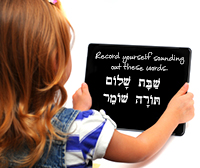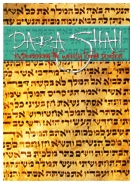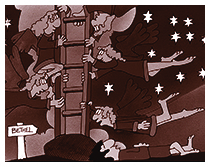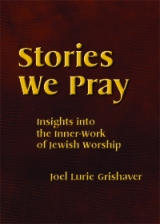At Torah Aura we have been talking about the future a lot. Not only are we concerned with the latest (and immediate) changes in the field, but we have been asking, “What is our future role?” We have come up with a number of answers. We like to share some of them with you.
![Review app for Tiyulim and Ot la-Ba'ot shutterstock_32222887 -2 [Converted]](https://tapbb.files.wordpress.com/2013/03/app-kid.jpg?w=180&h=243) APPs: We have decided to invest in apps rather than websites. First of all the security is much better. Second, and most importantly, you can take an app with you. You don’t need to be plugged in. Students can work in a parking lot, a dentist’s office, their own room, or wherever. Therefore, because we believe in the future of smartphones and tablets, we’ve made a commitment to applications. This year we are releasing apps for our two primers, Ot La-Ba’ot and Tiyulim. More will follow in the future.
APPs: We have decided to invest in apps rather than websites. First of all the security is much better. Second, and most importantly, you can take an app with you. You don’t need to be plugged in. Students can work in a parking lot, a dentist’s office, their own room, or wherever. Therefore, because we believe in the future of smartphones and tablets, we’ve made a commitment to applications. This year we are releasing apps for our two primers, Ot La-Ba’ot and Tiyulim. More will follow in the future.
 Recordings: We know that video games are fun, but it is really hard to evaluate a student’s proficiency from the number of passes a student’s avatar can make on a skateboard ramp. Because schools are emphasizing Hebrew (mechanical) reading, the only way to really evaluate their growth is by hearing them read. We know two things. First, that reading out loud in class is one of the things that most turns off students. Even if they read well, and don’t mind waiting a long time while everyone else performs, the listening to students who fail at the task is torturous. Second, we knew that Jane used to give her students audiotapes (remember audiotapes) and have them record readings at home. It was really successful for her and her students. Students had a chance to practice first, get help from parents where necessary, and record themselves without fear of being teased for mistakes in class. It also gave Jane a chance to focus on and note each student’s progress. We decided to build the right tech into our Hebrew Review apps. Now, students can read a passage into the phone (or tablet) and e-mail their reading (a wave file) to their teacher. The tech here is simple enough for any teacher who can open an e-mail.
Recordings: We know that video games are fun, but it is really hard to evaluate a student’s proficiency from the number of passes a student’s avatar can make on a skateboard ramp. Because schools are emphasizing Hebrew (mechanical) reading, the only way to really evaluate their growth is by hearing them read. We know two things. First, that reading out loud in class is one of the things that most turns off students. Even if they read well, and don’t mind waiting a long time while everyone else performs, the listening to students who fail at the task is torturous. Second, we knew that Jane used to give her students audiotapes (remember audiotapes) and have them record readings at home. It was really successful for her and her students. Students had a chance to practice first, get help from parents where necessary, and record themselves without fear of being teased for mistakes in class. It also gave Jane a chance to focus on and note each student’s progress. We decided to build the right tech into our Hebrew Review apps. Now, students can read a passage into the phone (or tablet) and e-mail their reading (a wave file) to their teacher. The tech here is simple enough for any teacher who can open an e-mail.
Experiential Education: We accept the premise that Jewish schools can no longer feel like regular schools. We believe that experiential education—camp style learning—is one of the key ways to go. We have created a series of experiential textbooks.
- Grades 3-4 Experiencing Jewish Holidays
- Grades 4-5 Experiencing the Torah
- Grades 5-7 Experiencing Jewish Prayer
- Grades 7-9 Experiencing Sacred Community
And to make all of this easier and clearer, and presently in process, an academic volume with the leaders in the field: Experience and Jewish Education, Edited by David Bryfman.
 Project Based Learning: We know that project based learning is tough on a couple a day (or less) time frame. Still it is a good thing. We have rewritten one of our old classics, Zot ha-Torah, simplified it, took out the Hebrew layer, added experiential activities, and added internet driven project based learning. It is now called: Parashah—Experiencing the Weekly Torah Portion.
Project Based Learning: We know that project based learning is tough on a couple a day (or less) time frame. Still it is a good thing. We have rewritten one of our old classics, Zot ha-Torah, simplified it, took out the Hebrew layer, added experiential activities, and added internet driven project based learning. It is now called: Parashah—Experiencing the Weekly Torah Portion.
Stuff: For a long time we have been selling big books, plush Torahs, puzzles, games, toys and all that kind of stuff. We also have one sided Simhat Torah flags so students can create the other side. A couple of years ago we added tallitot kits, hallah covers, siddur covers and other cloth craft resources. In the past year, we expanded our equipment and are now selling really big Israel maps, Alef Bet posters, giant board games and more. We have learned that when books are no longer at the center of what schools do—schools need lots of stuff.
 The Flipped Classroom: One of the latest innovations in public education has been the flipped classroom. Here, student listen to the lecture at home (on the internet) and then go to class to do the homework with their teacher’s help. This started in high school math and science and now is having lots of other applications. We believe that it is a really good way to do small increments of family education. We are going to start by putting Torahtoons on YouTube and publishing a new resource guide that will let you (a) create a short ten minute hope experience in preparation for (b) a classroom experiential session.
The Flipped Classroom: One of the latest innovations in public education has been the flipped classroom. Here, student listen to the lecture at home (on the internet) and then go to class to do the homework with their teacher’s help. This started in high school math and science and now is having lots of other applications. We believe that it is a really good way to do small increments of family education. We are going to start by putting Torahtoons on YouTube and publishing a new resource guide that will let you (a) create a short ten minute hope experience in preparation for (b) a classroom experiential session.
 E-Books, E-Textbooks. Many of our adult books have already been converted to e-books and by summer we will have a number of e-textbooks as well. We don’t know where the use of devices is heading in the classroom, but we are prepared to follow along.
E-Books, E-Textbooks. Many of our adult books have already been converted to e-books and by summer we will have a number of e-textbooks as well. We don’t know where the use of devices is heading in the classroom, but we are prepared to follow along.
We’re thinking about our place in the coming world and are interested in suggestions.


